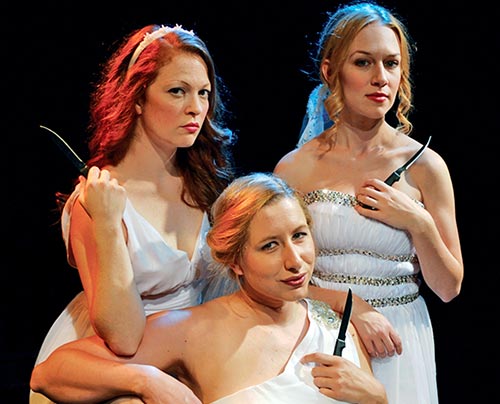By Jenn McKee

If you go to Hilberry Theatre's production of Charles L. Mee's "Big Love," you'll spot flustered brides in the lobby before the show; and an usher, wearing a white tuxedo jacket, will ask if you're to be seated on the bride's side or the groom's.
Why? Because Mee's play uses Aeschylus' "The Suppliant Women" as a blueprint, which tells the story of 50 sisters who resist arranged marriages to their 50 cousins. In "Big Love," we watch three of the sisters - fierce Thyona (Danielle Cochrane), hyper-feminine Olympia (Megan Barbour), and reflective Lydia (Sarah Hawkins Moan) - escape from Greece to Italy, and move into the home of a man named Piero (Brandy Joe Plambeck). The sisters appeal to him for protection, but when the cousins follow, the women find themselves with no good options.
Mee's plays, in his own words, aim to move beyond "traditional forms of psychological realism," and incorporate material from sources as disparate as the National Enquirer and judicial theory and lyricism.
Which means that although the stylized play is focused on a topic - in this case, romantic love, desire, gender roles, sex, and marriage - its dialogue veers off in all kinds of unpredictable directions, and includes deliberately provocative, chilling moments. For example, Thyona suggests that "boy babies should just be flushed down the toilet"; and Constantine (David Sterritt) - while pointing out that society asks men to turn violent when violence is called for, and then asks them to simply turn it off when the moment of crisis has passed - says that women should be thankful when their man assaults them, because he's educating her about the reality of how civilization works. (Yikes.)
So, although "Big Love" is billed as a dark comedy, and while the second act particularly provides several laughs, theatergoers should expect some pretty heavy, long, impassioned monologues.
And this demonstrates the inherent challenge of Mee's work: There are shocking, intellectually resonant moments like this - things that you'll likely ponder for days, maybe weeks or months, to come - but little to no material threatens to penetrate the heart. Mee seems defiantly uninterested in manipulating his audience's emotions, of course; but for me, a play that only addresses my intellect only half-satisfies.
The first act feels sluggish, bogged down by earnest speeches. There's a much-appreciated injection of energy and fun when the male cousins helicopter in to a cranked up AC/DC soundtrack - a nice staging choice by director Blair Anderson - but the proceedings are otherwise pretty dry.
But the second act's wedding sequence is the show's high point, perfectly marrying (pun intended) the production's design elements with the action on stage. As the couples experience this cultural ritual in fast forward - from the ceremony, to feeding each other cake to "Moon River," to dancing to a Sinatra standard, to boogying to "Cupid Shuffle" under disco lights - the show assumes an energy it otherwise lacks, right through the court scene that follows (after the Perry Mason theme song provides segue music).
Music plays a huge role in the show, so sound designer Samuel Byers deserves much praise for his contributions (Bobby DeLisle's original music contributions also work well); my one complaint was that the sound, at times, drowned out the actors' lines.
Lighting designer Thomas Schraeder, meanwhile, effectively underscored each scene's tone and guided the audience's focus; Anne Suchyta costumes efficiently differentiated the sisters' personalities and attitudes; Leazah Behrens projections added texture, and her scenic design - large, round mat at center stage, topped with a bathtub/shower, and a backdrop of three cracked ionic columns - was both suggestive and appropriately abstract; and Cheryl Turski movement direction often provided visual variation during the show's monologues, though the performers in one sequence appeared self-consciously marching band-like.
The actors generally throw themselves into the material with admirable abandon. Moan, as the middle ground between angry Thyona and love-hungry Olympia, necessarily carries the show's dramatic question, as she vacillates between loyalty to her sisters and her growing feelings for Nikos. Barbour and Cochrane make Olympia and Thyona physical manifestations of Lydia's id and super-ego, respectively, pulling the reluctant bride in different directions. Annie Keris has some funny moments as an aging matriarch and a house guest; and Griffith and Sterritt make their monologues memorable.
Early in "Big Love"'s second act, Griffith cries out, while leaping around the stage, "Little League never was for me!" It's a moment of comic absurdity, as is Keris' use of gunshots to announce the arrival of the wedding cake. These are little comic surprises that act as counterweight to the play's seriousness; but in the end, the scales are still wildly uneven, and those welcome flashes of quirkiness aren't quite plentiful enough.
REVIEW:
'Big Love'
Hilberry Theatre, 4743 Cass Ave., Detroit. 8 p.m. Oct. 31, Nov. 1, 2, Dec. 5-7; and 2 p.m. Oct. 30 & Dec. 7. $12-30. 313-577-2972. http://www.Hilberry.com









